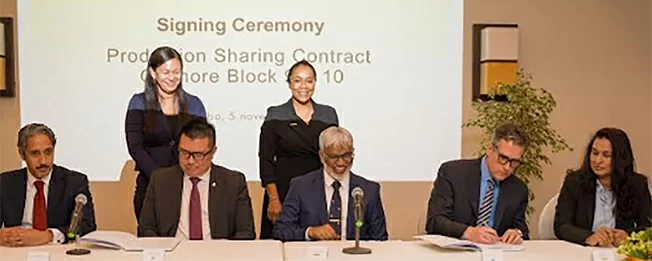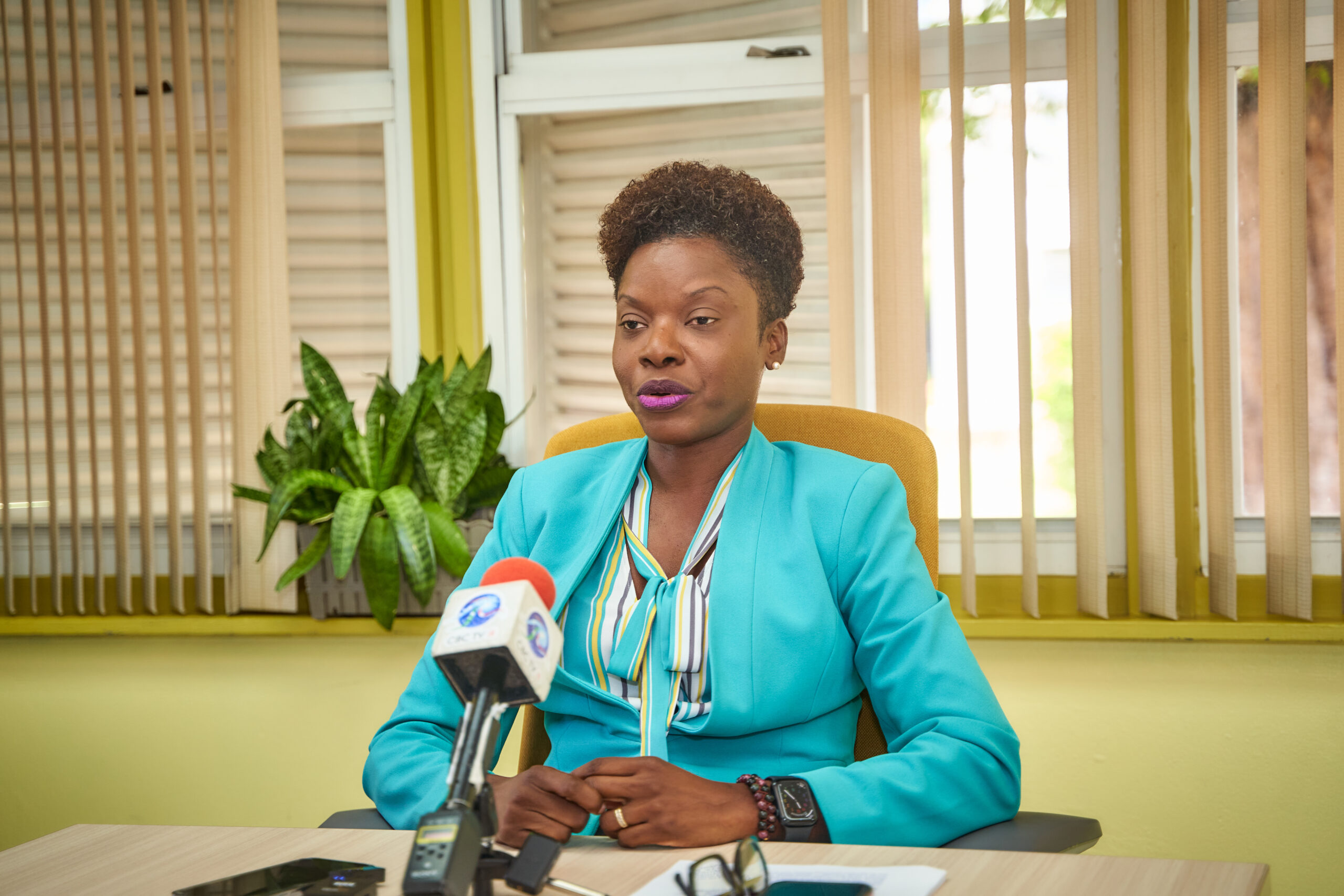Suriname has taken a significant step forward in its oil and gas sector by signing production-sharing contracts with global energy giants Chevron, QatarEnergy, and Petronas. The agreements, finalized on Wednesday, focus on oil blocks 9 and 10, which are expected to yield substantial benefits for the country and its state-owned oil company, Staatsolie. Unlike the Granmorgu area in Block 58, which holds vast deep-water reserves but requires high development costs, Blocks 9 and 10 are located closer to the coast in shallow waters of just 50 meters, significantly reducing expenses. Staatsolie’s CEO, Annand Jagesar, emphasized that Suriname will not bear any production costs but will earn revenue once oil production begins. The blocks are estimated to contain around 300 million barrels of oil, making them a profitable venture despite their smaller scale compared to Granmorgu’s 750 million barrels. The contracts stipulate that Suriname will benefit from tax revenues, profit oil, royalties, and income generated through Staatsolie’s subsidiary, Paradise Oil, which holds a 30% stake in Block 9 and 10% in Block 10. Additionally, the deals are expected to boost local employment and expertise. The partners are required to study existing geological data within the first three years and proceed with drilling in the second phase. Failure to meet these obligations will result in contract termination.
博客
-
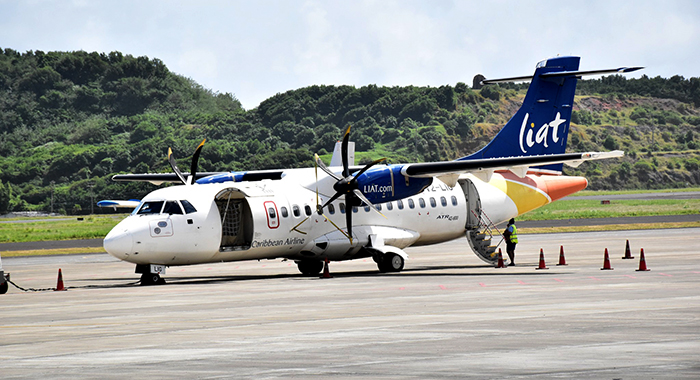
Former LIAT workers say SVG gov’t ignoring them
Former employees of the defunct regional airline LIAT (1974) Ltd. have voiced their frustration over the lack of progress in securing their severance payments. The workers, who lost their jobs when the airline collapsed in 2020 amid the COVID-19 pandemic, accuse the government of St. Vincent and the Grenadines of ignoring their plight. In a recent statement, they expressed deep disappointment with Prime Minister Dr. Ralph Gonsalves and Finance Minister Camilo Gonsalves for their handling of the matter. The workers highlighted their repeated attempts to engage with the government through formal letters, phone calls, and meetings, all of which have yielded no satisfactory resolution. Despite submitting a revised proposal in 2023, which included significant concessions on their part, the workers claim they have received no substantive feedback. The situation has left many in dire financial straits, with some losing their homes to foreclosure and others forced to migrate in search of work. The workers have called for a renewed commitment to human values and a more empathetic approach to labor issues, warning that the current treatment of workers is morally corrosive and undermines collective humanity.
-
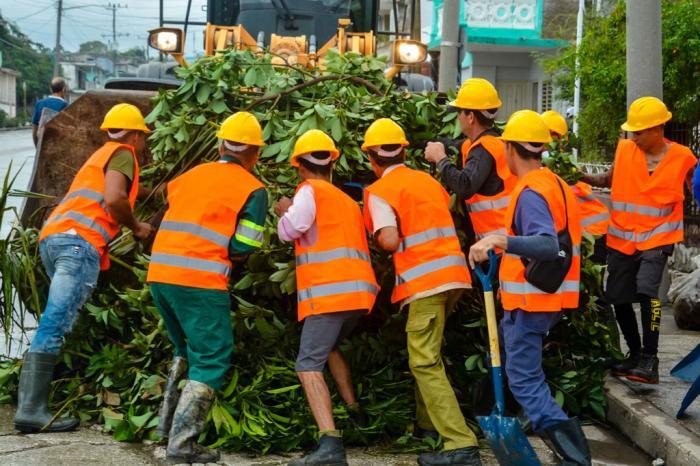
The noble resilience of this people is invincible
In the wake of Hurricane Melissa, Cuba has initiated extensive recovery efforts to address the widespread devastation across its eastern provinces. Preliminary estimates reveal that over 76,000 homes have been affected, with significant damage to infrastructure, crops, and essential services. President Miguel Díaz-Canel Bermúdez, addressing the nation during the National Defense Council meeting, praised the resilience and unity of the Cuban people, emphasizing that no lives were lost despite the severe material losses. The hurricane’s impact has been exacerbated by the ongoing U.S. economic blockade, which has strained resources and recovery capabilities. Over 1 million people were evacuated, with more than 54,000 still residing in shelters. Restoration efforts are underway, with electricity and water services being gradually reinstated in affected areas. The government has mobilized state agencies, international aid, and community participation to expedite recovery. President Díaz-Canel highlighted the collective spirit of the nation, stating, ‘In Cuba, we are all the state,’ and reaffirmed the commitment to ensuring no one is left behind. The recovery process is expected to be prolonged, but intensive work has already restored power and communications in several regions. The Ministry of Economy and Planning reported dynamic damage assessments, with thousands of homes partially or completely destroyed. Health and epidemiological measures have been prioritized to prevent disease outbreaks, while educational institutions are gradually reopening. International aid, including contributions from Germany, Norway, and Canada, has bolstered recovery efforts. The Cuban government remains steadfast in its resolve to rebuild and restore normalcy, underscoring the nation’s resilience and unity in the face of adversity.
-

What mechanisms are in place for receiving international donations in Cuba?
In response to the widespread devastation caused by Hurricane Melissa in eastern Cuba, the Cuban government has outlined the procedures for receiving and managing international donations. Granma interviewed William Díaz Menéndez, Director General of International Cooperation, and Zoe Hernández Portales, Director of ProCuba, both officials from the Ministry of Foreign Trade and Investment (Mincex), to provide clarity on the process. They explained that Decree Law No. 16 governs emergency situations, granting Mincex the authority to approve international donation offers. All legal entities in Cuba are permitted to manage and receive donations from various sources, including multilateral, bilateral, governmental, private, and individual contributors, including Cuban expatriates. Mincex oversees this process through its International Aid Group, ensuring that all state bodies report and coordinate donation offers for evaluation and approval. For in-kind donations, an expedited customs procedure is in place once Mincex grants approval, though designated importers must follow specific protocols. Financial donations can be directed to accounts in three Cuban banks: Banco Popular de Ahorro, Banco Financiero Internacional, and Banco Internacional de Comercio. The government clarified that there are no restrictions on donations, except for items with inherent limitations. A preliminary list of needed resources has been shared with Cuban missions abroad to facilitate the process. Both officials emphasized that while Cuba does not solicit aid, it deeply appreciates and facilitates the channels of solidarity offered during these challenging times.
-
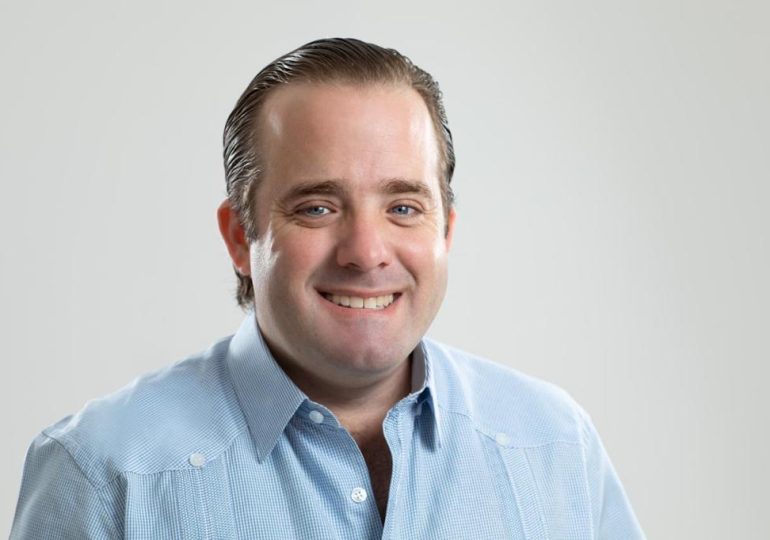
Paliza backs salary indexation but warns it shouldn’t harm the poor
In a recent statement, José Ignacio Paliza, the Dominican Republic’s Minister of the Presidency, highlighted the potential benefits of salary indexation as a mechanism to enhance the purchasing power of workers, particularly the middle class. However, he stressed that such measures must not negatively impact the nation’s most vulnerable populations. Speaking after a meeting of the PRM Executive Directorate on Friday, Paliza underscored the importance of balancing economic reforms with social equity. The proposed salary indexation is part of a broader government reform initiative introduced last year to address persistent inflation and improve family incomes. Paliza acknowledged the challenge of compensating for potential revenue losses to the State but firmly rejected suggestions to fund the initiative by cutting subsidies or social programs. He pointed out that these programs support over 700,000 Dominicans and have been instrumental in reducing poverty to historic lows. Paliza’s remarks reflect the government’s commitment to fostering economic growth while safeguarding social welfare.
-

DOE: Ronald Venetiaan blijft voorbeeld van integriteit en staatsmanschap
The Party for Democracy and Development in Unity (DOE) has expressed profound sorrow over the passing of former President of the Republic of Suriname, Ronald Venetiaan. Affectionately known as “Vene” or “El Vene,” Venetiaan served three terms as head of state, making him the longest-serving president in Suriname’s history. His leadership was marked by principles, integrity, and a commitment to public service, playing a pivotal role in restoring democracy after a period of military rule. During his tenure, he ended the civil war and championed socio-economic recovery, political stability, and regional cooperation within the Caribbean Community (CARICOM). The DOE described Venetiaan as a principled leader—sometimes beloved, sometimes criticized—but always steadfast in his convictions. “To this day, there is no president comparable to Vene,” the party stated. His passing is seen as an opportunity to reflect on the values he embodied: ethics, justice, transparency, and national unity. DOE Chairman Steven Alfaisi emphasized, “These are ideals we must continue to fight for, despite all challenges.” The party extended its heartfelt condolences to the Venetiaan family, his friends, members of the National Party of Suriname (NPS), and the Surinamese people. “His flame has been extinguished, but his ideals continue to burn. His legacy will forever inspire us to work in the best interest of the nation and its people,” the DOE concluded. Rest in peace, El Vene.
-
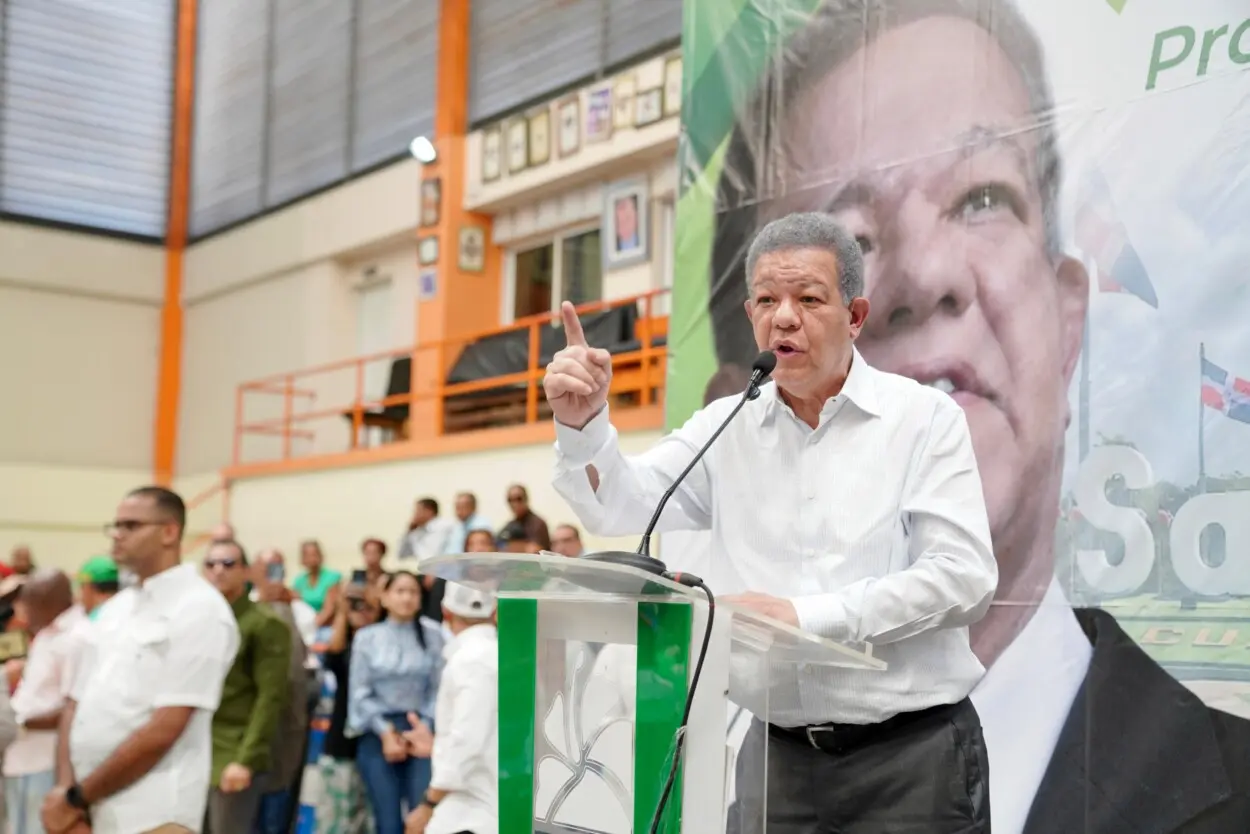
Leonel Fernández urges inflation adjustment to protect workers’ income
In a compelling statement on Thursday, Leonel Fernández, former President of the Dominican Republic and leader of the People’s Force, raised concerns over the detrimental effects of inflation on the nation’s workforce. Describing inflation as a “hidden tax,” Fernández emphasized the urgent need for policy adjustments to protect workers’ incomes and ensure tax equity.
-
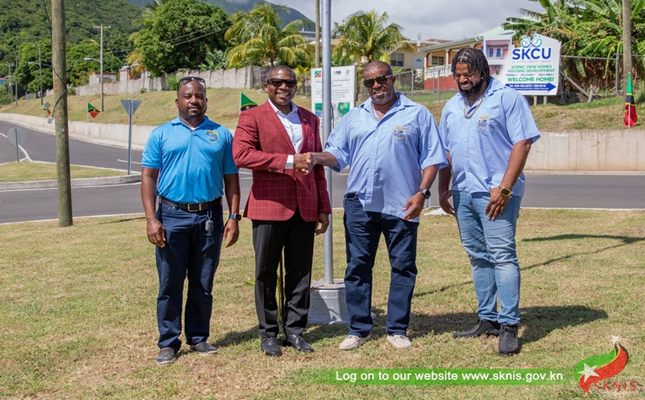
Government opens reconstructed St. Peter’s Main Road
The government of St. Kitts and Nevis has officially inaugurated the newly reconstructed St. Peter’s Main Road, marking a significant milestone in the island’s infrastructure development. The project, executed by Rock and Dirt Construction, spans over three miles and includes comprehensive upgrades such as road reconstruction, base stabilization, asphalt resurfacing, and the installation of retaining walls, curbs, sidewalks, and advanced drainage systems. This multimillion-dollar initiative is part of the government’s Aggressive National Road Infrastructure Programme, aimed at enhancing safety, accessibility, and equitable development across communities. Minister of Public Infrastructure Konris Maynard emphasized that the project symbolizes progress and opportunity for the people of St. Kitts and Nevis, particularly in the fast-growing St. Peter’s area. Prime Minister Dr. Terrance Drew, who has a personal connection to the community, praised the project’s high-quality execution by local contractors and highlighted its significance in addressing long-standing neglect. The completion of St. Peter’s Main Road is expected to serve as a catalyst for further development in the region.
-

Recreational club for senior citizens opens in Santo Domingo
Santo Domingo has welcomed a new haven for senior citizens with the inauguration of La Casa de Don Carlos, a recreational club designed to promote holistic well-being, socialization, and happiness among the elderly. The project, launched on Thursday, aims to honor the wisdom and contributions of older generations while providing them with a safe and enriching environment.
